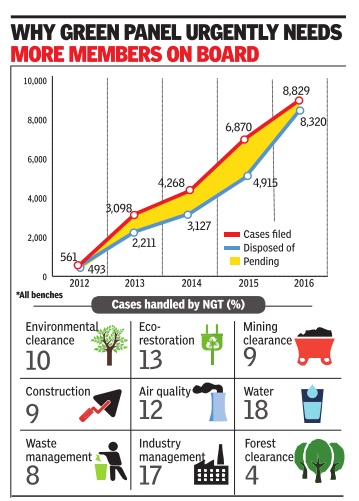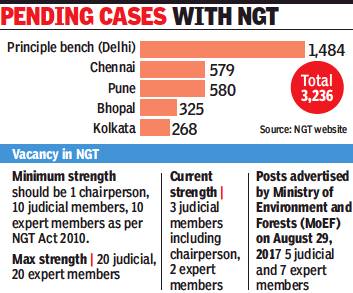National Green Tribunal
This is a collection of articles archived for the excellence of their content. |
Contents |
Benches of NGT
SC: NGT not to set up single-judge bench
The Supreme Court said that no single-judge bench should be constituted to hear and decide matters in the National Green Tribunal (NGT), making it difficult for the quasi judicial body to adjudicate cases in view of large vacancies in its various branches.
A bench of Chief Justice Dipak Misra and Justices A M Khanwilkar and D Y Chandrachud said that single-judge bench could not be allowed to decide cases and matters must be heard by division bench. The court was hearing a plea of NGT Bar Association challenging the constitutional validity of the NGT (Practices and Procedures) Amendment Rules, 2017 that allows a single member bench to perform judicial functions.
Senior advocate Mukul Rohatgi, appearing for the Bar, said that experts with no knowledge of law are deciding the cases even in the absence of judicial member in the bench. “If there is nobody at the NGT to hear cases, can they resort to illegality? If NGT is not functional, send the cases back to HCs and scrap the tribunal,” he said.
Case work
As in 2018
Jayashree Nandi, July 15, 2018: The Times of India

From: Jayashree Nandi, July 15, 2018: The Times of India
The new chairman of National Green Tribunal (NGT), Adarsh Kumar Goel, will have to deal with a backlog of over 3,000 cases.
Goel, who took charge on July 8, will take up first a landmark petition on Delhi’s air pollution filed by advocate Vardhaman Kaushik in 2014. He is likely to take a call on one of the most contentious interim orders in the case—whether new diesel vehicles can be registered in the capital.
By the month-end, the Yamuna cleaning-up petition will be before him.
A bench headed by former NGT chairperson Justice Swatanter Kumar, who retired in December 2017, had on December 11, 2015 directed that no new diesel vehicle would be registered in Delhi till January 6, 2016.
The tribunal had ordered the Delhi government not to register any diesel vehicle because of their high particulate matter (PM) emissions. It also asked the Centre and the Delhi government to stop procuring diesel vehicles for their departments. The bench stated that there would be no renewal of registration of over 10-year-old vehicles in Delhi.
Since then, several miscellaneous applications have been filed by individuals, corporations and government departments seeking permission to procure and register diesel vehicles. However, the ban stayed.
Goel has recently asked for a case brief and a synopsis of earlier directions. “We have already submitted a compilation of earlier orders. The chairperson will be briefed on the diesel vehicle registration issue and the aspect may be resolved on Tuesday so that there is clarity on whether diesel vehicles are to be registered in Delhi,” said Sanjay Upadhyay, advocate for Kaushik.
The compilation of orders on air pollution suggested that NGT has passed over 100 directions—burning of agricultural residue prohibited, plying of over 10-yearold diesel vehicles banned in NCR, construction activities to be undertaken under stringent precautions to cut dust pollution, strict penalty on burning waste, and setting up an emergency response system based on PM 10 and PM2.5 levels in the national capital region (NCR).
While banning the registration of diesel vehicles, NGT had cited a report by Central Pollution Control Board (CPCB), which observed that each diesel vehicle causes pollution as much as 24 petrol cars and 40 CNG cars. But the Centre, particularly the Union transport ministry, had maintained that these vehicles contribute to less than 1% of PM2.5 emissions in the city. But the case is yet to be closed as it has branched out into several aspects of air pollution.
The other landmark case that Goel will hear has been filed by Yamuna activist Manoj Mishra on restoring and cleaning the river. Mishra filed the petition in 2012, but the issue, too, soon branched out into several difficult aspects of the Yamuna cleanup, including inter-state agreements on Delhi’s share in the river water. On January 13, 2015, an NGT bench gave a 100-page judgment on dealing with the pollution, ecological flow and restoration of the Yamuna floodplains.
The judgment stated that a decentralised sewage treatment network consisting 55 sewage treatment plants (STPs) would be set up to ensure each drain discharging into the Yamuna carries treated waste water. It also said an environmental flow had to be maintained in the river in consultation with the Haryana government. None of these has been implemented yet, only a few tenders for STPs in Burari have been floated by Delhi Jal Board. Goel may dispose of some long-pending cases soon, said lawyers at NGT. Many such cases are also being heard by the Supreme Court and the high court.
Personnel issues
2017/ Understaffed
Jayashree Nandi, Plenty of cases, but not enough staff for NGT, May 2, 2017: The Times of India

The National Green Tribunal (NGT), which is hearing matters of national importance like the restoration of Ganga and Yamuna, is facing a severe manpower crunch. Many important cases are getting delayed or not being taken up at all because the tribunal doesn't have enough judicial and expert members to resolve these matters. NGT has been running on an inadequate staff strength since its inception in 2012. However, the number of cases being handled by it increased from 561 in 2012 to 8,829 in 2016.
Recently , more than one lakh cases of industrial pollution in Tamil Nadu were transferred to NGT by the Madras high court after it dissolved the Loss of Ecology Authority , which was considering appeals for compensation by affected farmers in the Noyyal and Amravati regions. NGT, however, will not be able to take up these matters because it doesn't have the required manpower to hear them.
At present, the green court has seven judicial members and seven experts while it requires 20 in each segment, sources said. A judicial member can be anyone who is or has been a Supreme Court judge, an HC chief justice or an HC judge while an expert member is a technical expert in any aspect of environment. These members are appointed by the ministry of environment.
The NGT Act, 2010, says at no time, the tribunal will have less than 10 judicial and expert members. The same judicial and expert members are handling cases of different zones. For example, Ajay Deshpande from NGT's western bench in Pune has expertise in river and air pollution.He is brought to Delhi to hear the Ganga case but at the same time, he is handling matters in the western bench.As a result, the environmen tal clearance to the Mopa airport in Goa is getting delayed.
Usually in “part-heard“ matters, the composition of judges and expert members is to be maintained till the end because they are aware of the case history. Similarly, in the eastern bench in Kolkata, river expert member P C Mishra -who was hearing crucial cases such as opposition to the Mapithel dam in Manipur, environmental impact of the Lower Subansiri hydroelectric project dam in Arunachal Pradesh and the Teesta IV hydroelectric project in Sikkim -has been moved to another bench in Pune. These part-heard cases in the Kolkata bench are getting delayed due to absence of the same composition of judges and expert members. “The ministry talks about speedy clearances and justice, then why isn't it providing NGT with adequate staff,“ asks environmental lawyer Ritwick Dutta.
NGT has written to the environment ministry more than once for expediting appointments, but hasn't received a response. “The environment ministry is our governing body and the NGT Act clearly lays down that the ministry will make these appointments. So, we have no option but to wait. We have stopped our circuit benches in Shillong, Jodhpur and Kochi; instead they are being heard in Delhi,“ said an NGT office-bearer who does not wish to be identified.
A ministry official told TOI that NGT “was are running at 70% capacity . They need a total of 10 in each category ...We advertised for some of these positions a couple of months ago, but didn't get enough applications. The deadline for applications expired yesterday“.
2018/ Benches shut, NGT forces petitioners to come to Delhi

From: Jayashree Nandi, Benches shut, NGT forcing petitioners to come to Delhi, April 26, 2018: The Times of India
Staff Crunch Has Forced Tribunal To Close 4 Regional Benches
Abhijit Prabhudesai, a Goa-based environmentalist, has travelled to Delhi six times since last December to appear before the National Green Tribunal’s (NGT’s) principal bench, which is hearing his petition on environmental concerns regarding the Mopa airport in north Goa. His plea was being heard by NGT’s Pune bench until the tribunal started facing severe shortage of judicial members, closing it down temporarily, along with its regional benches in Pune, Bhopal, Chennai and Kolkata.
Prabhudesai is among several petitioners from aroundthe country who have exhausted their resources to pull through their cases.
Many petitioners do not have the resources to travel to Delhi, so they have been waiting indefinitely for NGT hearings to resume at regional benches. “I’m shattered financially. Even after hearing the case so many times, acting chairperson of NGT justice UD Salvi retired before closing the matter. This means I have to keep going to Delhi,” said Prabhudesai.
On Wednesday afternoon, office-bearers, who discussed the backlog of cases, said: “NGT has not seen worse days. We have so many important environmental cases pending but there is nobody to hear them,” one said.
Against a minimum strength of one chairperson, 10 judicial members and 10 expert members, NGT has only three judicial members, including acting chairperson justice Jawad Rahim, and two expert members. The slow down in appointments had begun a couple of years ago when NGT had written more than once to the Union environment ministry, appealing them to expedite the process. But in June, the Finance Act 2017 ‘diluted’ several provisions of NGT. It also gave undue power to the Centre to decide on qualifications, appointment, term of office, salary and removal of the chairperson and other members of the tribunal by overturning the minimum requirements laid down by the NGT Act, according to lawyers.
Environmental and legal experts are worried about the future of NGT. “Why should petitioners suffer because of the inefficiency of the government? People have to travel to Delhi from far-off places. The government should make a separate fund for their travel. By slowing down hearing of cases, the government is violating citizens’ right to life,” said Ritwick Dutta, environmental lawyer.